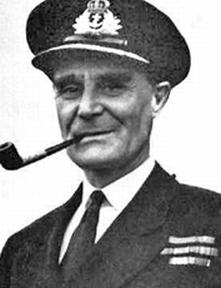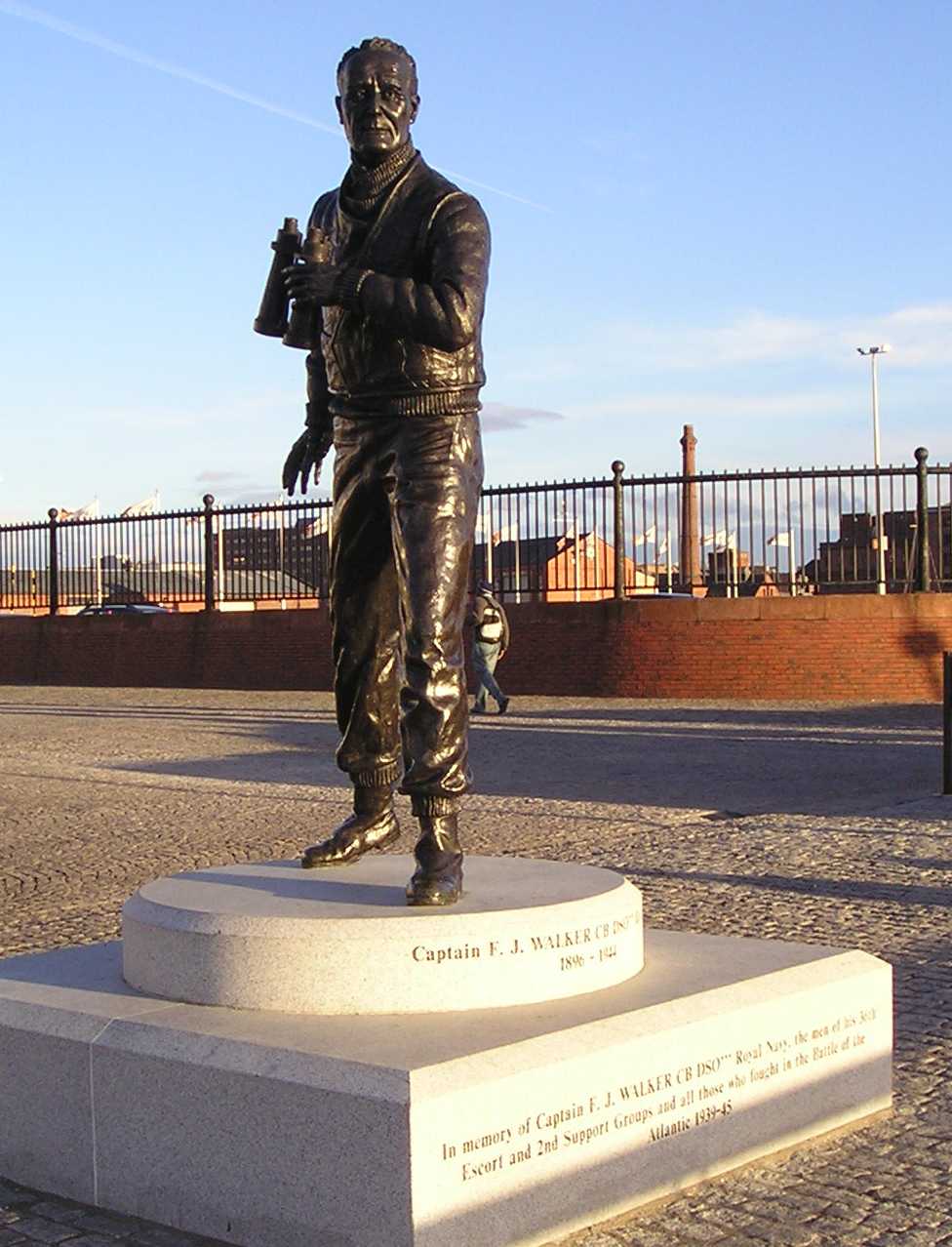Walker, Frederick John
- Date of birth:
- June 3rd, 1896 (Plymouth/South West England, Great Britain)
- Date of death:
- July 9th, 1944 (Seaforth/Merseyside,Great Britain)
- Mentioned on:
- Plymouth Naval Memorial
- Nationality:
- British
Biography
Walker went to Britannia Royal Naval College, Dartmouth, where he excelled. First serving in the First World War, Walker partook during the inter-war period Walker in the particularly unglamourous field of anti-submarine warfare. He took a course at the newly founded anti-submarine training school. Walker would consequently become an expert in this particular type of warfare, and would be appointed to a post specialising in this field, serving on a number of capital ships.
During the Second World War Walker sank more U-boats during the Battle of the Atlantic than any other British or Allied commander and was instrumental in the Allied victory of the Battle of the Atlantic, one of the most important campaigns of the war. Walker suffered a cerebral thrombosis on 7 July 1944 and died two days later at the Naval Hospital at Seaforth, Merseyside aged 48; his death was attributed to overwork and exhaustion.
In 1998 a statue by Liverpool sculptor Tom Murphy of Captain Johnnie Walker in a typical pose was unveiled at the Pier Head in Liverpool by HRH the Duke of Edinburgh. The campaign for the statue had been launched by the Captain Walker's Old Boys Association.
Promotions:
January 6th, 1916: Sub-Lieutenant
August 15th, 1917: Lieutenant
August 15th, 1925: Lieutenant-Commander
December 31st, 1931: Commander
June 30th, 1942: Captain
Do you have more information about this person? Inform us!
- Period:
- Second World War (1939-1945)
- Rank:
- Commander
- Unit:
- Royal Navy
- Awarded on:
- August 16th, 1940
- Period:
- Second World War (1939-1945)
- Rank:
- Commander
- Unit:
- H.M.S. Stork (L81), Royal Navy
- Awarded on:
- January 6th, 1942
For daring, skill and determination while escorting to this country a valuable Convoy in the face of relentless attacks from the enemy, during which three of their Submarines were sunk and two aircraft destroyed by our forces."
- Period:
- Second World War (1939-1945)
- Rank:
- Captain
- Unit:
- H.M.S. Stork (L81), Royal Navy
- Awarded on:
- July 30th, 1942
"For leadership and skill in action against enemy submarines while serving in H.M. Ships Stork and Vetch."
Second DSO awarded as a bar for on the ribbon of the first DSO.
- Period:
- Second World War (1939-1945)
- Rank:
- Captain
- Unit:
- H.M.S. Starling (U66), Royal Navy
- Awarded on:
- September 14th, 1943
"For leadership and daring in command of H.M.S. Starling in successful actions against enemy submarines in the Atlantic."
- Period:
- Second World War (1939-1945)
- Rank:
- Captain
- Unit:
- H.M.S. Starling (U66), Royal Navy
- Awarded on:
- February 22nd, 1944
"For gallant and distinguished services in the destruction of two U-boats while serving in H.M. Ships Starling, Kite, Wildgoose and Woodcock, patrolling in the North Atlantic."
Third DSO awarded as second bar for on the ribbon of the first DSO.
- Period:
- Second World War (1939-1945)
- Rank:
- Captain
- Unit:
- H.M.S. Starling (U66), Royal Navy
- Awarded on:
- June 13th, 1944
"For outstanding leadership, skill and determination in H.M. ships Starling, Wild Goose, Kite, Woodpecker and Magpie in the destruction of six U-boats in the course of operations covering the passage of convoys."
in the North Atlantic
Fourth DSO awarded as third bar for on the ribbon of the first DSO.
- Period:
- Second World War (1939-1945)
- Rank:
- Captain
- Unit:
- H.M.S. Starling (U66), Royal Navy
- Awarded on:
- June 20th, 1944
"For outstanding leadership, skill and devotion to duty in H.M. ships Starling, Wild Goose and Wanderer on convoy escort duty in the North Atlantic."
- Period:
- Second World War (1939-1945)
- Rank:
- Captain
- Unit:
- H.M.S. Starling (U66), Royal Navy
- Awarded on:
- August 14th, 1944
Posthumously awarded
Sources
- Photo 1: Royal Navy
- - Second Supplement to The London Gazette Issue 34925 published on the 16 August 1940
- Fourth Supplement to The London Gazette Issue 35407 published on the 2 January 1942
- Supplement to The London Gazette Issue 35648 published on the 28 July 1942
- Third Supplement to The London Gazette Issue 36169 published on the 10 September 1943
- Supplement to The London Gazette Issue 36390 published on the 18 February 1944
- Fifth Supplement to The London Gazette Issue 36561 published on the 9 June 1944
- Supplement to The London Gazette Issue 36572 published on the 16 June 1944
- Third Supplement to The London Gazette Issue 36634 published on the 28 July 1944
- Historynet.com
- Uboat.net






